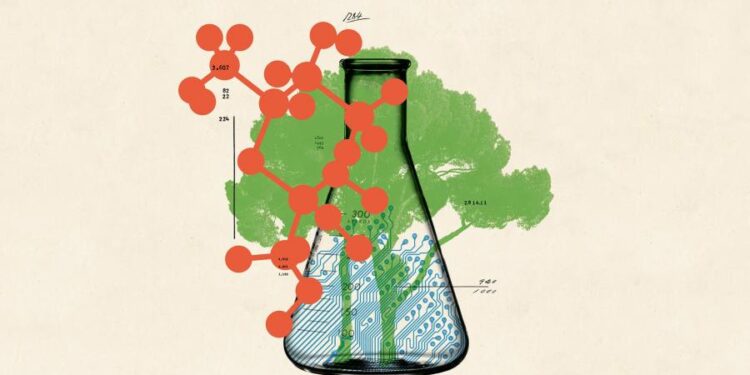Eric Schmidt, former CEO of Google, became one of the wealthiest people in the US by specialising in software engineering. Yet, if he was starting out again today, Schmidt says he would not be targeting bits and bytes alone. The 67-year-old thinks the next big thing is the “bioeconomy”, not the internet.
This catch-all label, Schmidt explained to me at the Aspen Ideas forum last month, describes “the use of biological processes to make use of things that we consume and manufacture… advances in essentially molecular biology… plus advances in AI have allowed us to do new techniques and grow new things.”
Helpfully, he listed a few innovations this economy might include: new plastics that naturally degrade without polluting water, “biologically neutral” cement that does not hurt the environment, soil microbes that reduce fertiliser use, soy-based roof-coating that reduces urban heat and, my favourite, compostable dining ware such as edible forks. Put another way, the bioeconomy is based on stuff that is grown using synthetic biology.
“Molecules are becoming the new microchip,” echoed Walter Isaacson, the prolific biographer and former Time Magazine editor, also at the Aspen forum. “Molecules are able to be reprogrammed the way we reprogrammed microchips.”
The small difference, Isaacson said, is that in synthetic biology “the code is not digital, or binary with zeros and ones, but it has four letters”. For Isaacson the key is that synthetic biology, like computing, is rooted in an “information revolution”, which for the bioeconomy started around the millennium when the human genome was sequenced.
It sounds exciting. But there is a snag for bioeconomy believers, such as Schmidt: scientists have been proclaiming a bioscience revolution for decades. And although investors have put money into the sector, relatively few of these innovative ideas, for edible cutlery, biofuels or anything else, have delivered scaleable products that have changed our lives, let alone produced the type of commercial success that companies such as Google have enjoyed in the internet world.
Indeed, in spite of the hype, investors have recently run away from the sector, as the global economy slows down. In the past year, the aggregate enterprise value of bioscience companies has fallen by more than 70 per cent from its 2021 peak. Tim Opler, managing director of the Torreya investment bank, told the FT in June that today’s would-be bioeconomy entrepreneurs face a financial “Sahara” because “there is no money to be found”.
Why? One issue is the science has advanced more slowly than many hoped. Another is government regulation. There’s a more fundamental problem too: whereas a couple of teenage computer nerds can build an internet company out of a garage, creating a bioscience business requires lots of expertise, specialised talent, manufacturing-plant capacity and time. These are not things that the US venture capital industry that funded the tech revolution is widely used to handling.
Despite the obstacles, both Schmidt and Isaacson insist that the long-delayed revolution is ready to accelerate. That is partly down to advances in science that have been helped by the application of AI. “The technologies didn’t work 10 years ago, but they do now,” says Schmidt. For Isaacson, “This stuff has been kicked up a notch because scientists have now realised that they cannot only read the code [of DNA] but edit it too.”
Then there’s geopolitics. China is currently racing ahead in the bioscience field. That creates mounting pressure for the White House to respond. Indeed, Schmidt, who has advised Joe Biden on science, is telling the US government that there could be considerable political benefits in funding this bioeconomy. A foundation that he chairs calculates that the sector could swell to $4tn in the next decade or two, creating one million skilled jobs in deprived areas.
“It’s the new industrial age applied to the rural parts of America,” he told me, noting that unlike current tech innovation “these jobs are not in Silicon Valley and they’re not in the north-east… they’re in… the Republican States. They’re in the states with an awful lot of farming.” He hopes that the fact that these rural, agricultural states tend to be red not blue gives his pitch bipartisan appeal, since it will get Republican politicians involved.
Of course, it will be hard to make this happen at speed or scale without some public-private partnership, and joined-up policymaking. And that is all too rare in the US. But Schmidt remains optimistic. “We are going to have a number of additional unicorns and trillion-dollar companies in this bioeconomy,” he insists.
Follow Gillian on Twitter @gilliantett and email her at gillian.tett@ft.com
Follow @FTMag on Twitter to find out about our latest stories first











